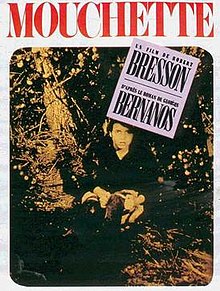From Our Archives
Robert Bresson directed Mouchette, one of his acclaimed films, a tragic drama starring Nadine Nortier and Jean-Claude Guilbert, based on the novel of the same name by Georges Bernanos.
| Mouchette | |
|---|---|

Film poster
|
|
Bresson was intrigued by the fact that the novel has neither psychology or analysis in it.
It was entered into the 1967 Cannes Film Festival, winning the OCIC Award (International Catholic Organization for Cinema and Audiovisual).
A coming-of-age story, Mouchette is set in a rural French village and follows the daughter of a bullying alcoholic father and ailing mother. Unfolding in the director’s famously sparse and minimalist style, Bresson views the girl as a victim of misery and cruelty, representing the results of wars, concentration camps, tortures, assassinations.
The Criterion Collection DVD release includes a trailer for the film made by Jean-Luc Godard. The Artificial Eye DVD release includes a documentary about the making of the film.
Mouchette, whose name means “little fly,” lives in an isolated French village with her alcoholic father and bedridden dying mother, taking care of her infant brother. Ostracized at school for her bedraggled clothes, she is chastised by her teacher for refusing to sing.
Once, in contrast to the misery of her daily life, Mouchette goes to a fair, where a kind woman buys her a token to ride on the bumper cars. She and a young man bump into each other’s cars and there are signs of a mutual flirtation, but her father takes her away.
Lost in the woods when a rainstorm begins., she is taken by Arsène, an alcoholic epileptic poacher. Fearing that has killed a man earlier, he attempts to use Mouchette as alibi to clear him of the blame.
He suffers a seizure and she tends to him gently, only to be later raped by him. Mouchette escapes back home, helping to take care of her baby sister.
When her mother requests a bottle of alcohol to die without pain, she tries to talk her out of it, but to no avail.
Mouchette then witnesses hunters shooting and killing rabbits, and shocked by the horror she begins rolling down several hills, her clothes soiling, until she splashes into the river never to return.
Besides favored non-professional actors, Bresson liked to cast actors he had never used before.
The one exception is Jean-Claude Guilbert, who had appeared as Arnold in Au Hasard Balthazar, and plays Arsène in this film.
The lack of sentimentality or sadism in Bresson’s portrayal of Mouchette’s suffering is notable, with Bresson suggesting that Mouchette is not a child for anyone’s pity, except her creator’s.
Deeply grim and pessimistic, the film is conceived as a religious experience in which the heroine is not a saint, and there is no conventional religious reference.
Critical Status
In 1967, Mouchette won the OCIC Award (International Catholic Organization for Cinema and Audiovisual) at the Cannes Film Festival, and the Pasinetti Award at the Venice Film Fest.
Swedish director Ingmar Bergman reportedly praised and loved the film, and Russian filmmaker Andrei Tarkovsky listed the film as one of the ten favorite movies.
Sight & Sound’s critics’ poll placed Mouchette in its top 20 in 1972, and in the magazine’s 2012 poll of the greatest films, Mouchette placed 107th in the directors’ poll and 117th in the critics’ poll.
Cast
Nadine Nortier Mouchette
Jean-Claude Guilbert Arsène
Marie Cardinal Mother
Paul Hebert Father
Jean Vimenet Mathieu
Marie Susini Mathieu’s wife
Suzanne Huguenin Layer-out of the Dead
Marine Trichet Louisa
Raymonde Chabrun Grocer
Credits
Directed by Robert Bresson
Screenplay by Bresson, based on Mouchette, 1937 novel by Georges Bernanos
Produced by Anatole Dauman
Cinematography Ghislain Cloquet
Edited by Raymond Lamy
Music by Jean Wiener, Claudio Monteverdi
Distributed by UGC / CFDC
Release date: October 26, 1967
Running time: 81 min.










